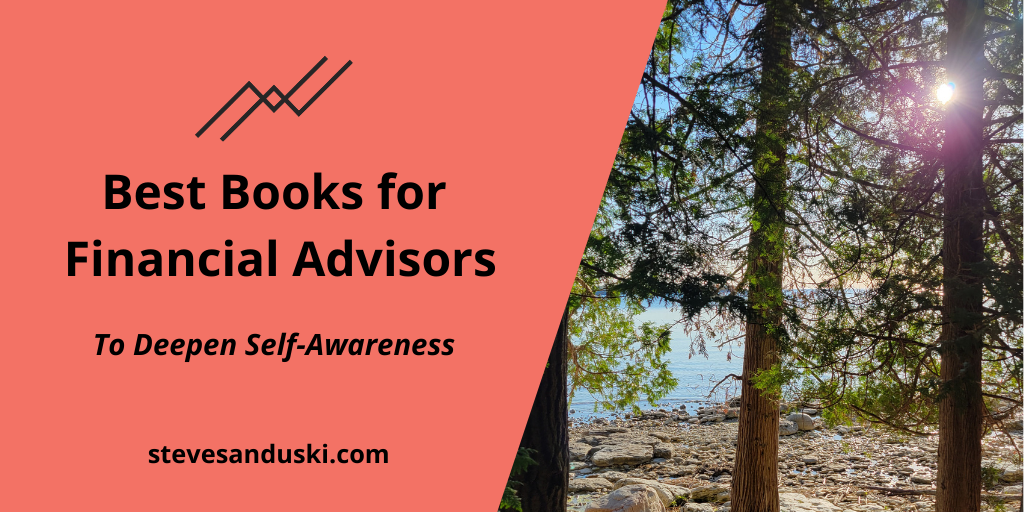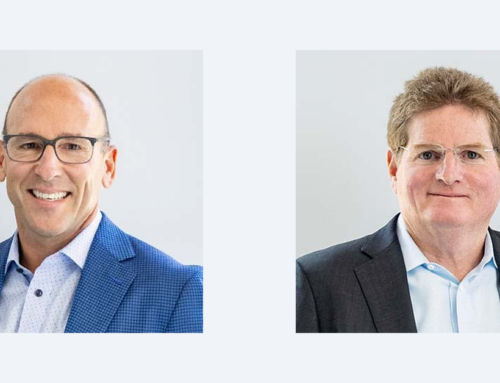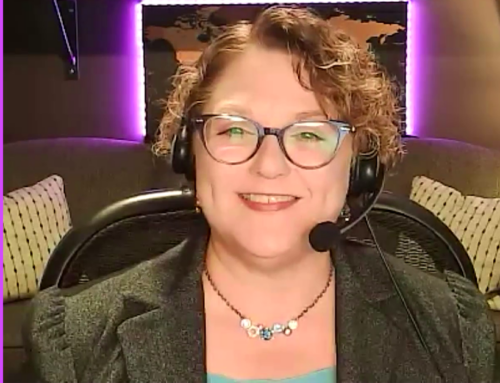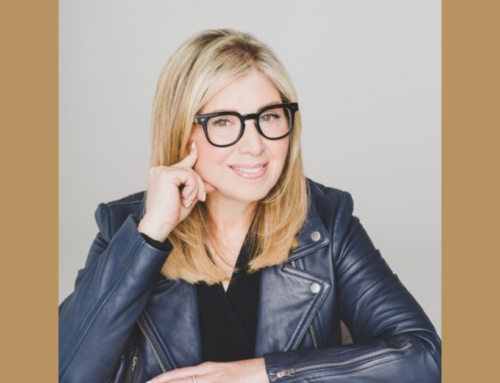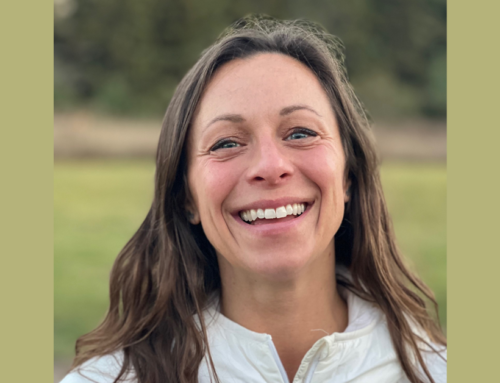This is the first in a series of best books for financial advisors posts. Each post will cover a certain aspect of being an indispensable advisor and guide you along your path to mastering advice.
Regardless of where you are in your financial advisor journey, you will find deep wisdom in these best books for financial advisors. I’ve read all of them and refer back to them regularly. In fact, I’ve read some of them multiple times and always find new insights and applicability to where I am at that point in my life.
I’m publishing my series of best books for financial advisors in the order that I recommend you read them. First up is working on deepening your self-awareness.
7 Best Books for Financial Advisors on Deepening Self-Awareness
If you’re only skimming the surface of who you are, it’s difficult to go deep and discover who your clients are. As you deepen your self-awareness, you put yourself in a better position to guide your clients along their path in life. You can better appreciate where they’ve been and where they are. You have more empathy. And the level of your conversation will rise to the point where insights and transformations can take place.
1. Mastery: The Keys to Success and Long-Term Fulfillment by George Leonard
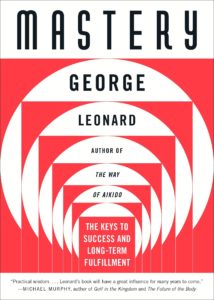 Self-awareness is a never-ending process. We can always go deeper. Similarly, no one is ever a master at anything. Not Tiger Woods. Not Michael Jordan. There’s always another layer to be uncovered. Another nuance to discover. The end is not the goal. Finding yourself along the way is.
Self-awareness is a never-ending process. We can always go deeper. Similarly, no one is ever a master at anything. Not Tiger Woods. Not Michael Jordan. There’s always another layer to be uncovered. Another nuance to discover. The end is not the goal. Finding yourself along the way is.
By starting with Mastery and getting yourself on your own mastery journey, you create a structure within which everything else you do will pour.
In his book, Leonard wrote,
For a master, the rewards gained along the way are fine, but they are not the main reason for the journey. Ultimately, the master and the master’s path are one. And if the traveler is fortunate—that is, if the path is complex and profound enough—the destination is two miles farther away for every mile he or she travels.
Leonard is a fascinating guy who passed away in 2010. Here are two videos with him about awakening your body’s energies, Part 1 and Part 2.
2. Elevate: An Essential Guide to Life by Joe Deitch
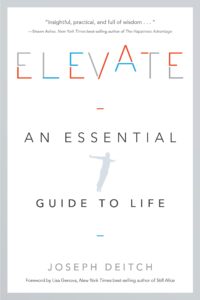 Deitch is the founder of Commonwealth Financial Network and a past podcast guest (listen here). In Elevate, Deitch divided the book into two parts: “Awareness” and “Action.” They’re meant to signify our internal and external journey. What I like about his book is it’s a great “survey” of wisdom that’s been handed down over millenniums. You’ll likely find something here that makes you go, “hmm, I’m gonna research that further.”
Deitch is the founder of Commonwealth Financial Network and a past podcast guest (listen here). In Elevate, Deitch divided the book into two parts: “Awareness” and “Action.” They’re meant to signify our internal and external journey. What I like about his book is it’s a great “survey” of wisdom that’s been handed down over millenniums. You’ll likely find something here that makes you go, “hmm, I’m gonna research that further.”
In his book, Deitch wrote,
Making the choice to begin seeing ourselves accurately, warts and all, is a powerful step in our growth. Only when we recognize our shortcomings can we begin to remedy them. Only when we perceive our true strengths can we leverage their power. And only when we seek what we don’t know can we really start to learn.
Work on yourself first so you don’t have to experiment on others.
3. Repacking Your Bags: Lighten Your Load for the Good Life by Richard Leider and David Shapiro
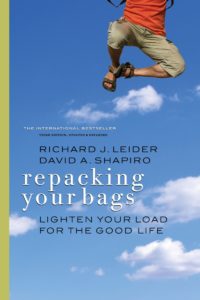 I first read this more than 20 years ago and it’s now in its third edition. The authors use the metaphor of baggage to help remind us that “life is a journey in that what we experience along the way is intimately bound up in the baggage–emotional, intellectual, and physical–that we are carrying. What we carry in our bags defines how we spend our time and how we spend our time determines how we live and who we are.”
I first read this more than 20 years ago and it’s now in its third edition. The authors use the metaphor of baggage to help remind us that “life is a journey in that what we experience along the way is intimately bound up in the baggage–emotional, intellectual, and physical–that we are carrying. What we carry in our bags defines how we spend our time and how we spend our time determines how we live and who we are.”
This book serves a dual purpose. It will help you find deeper meaning in your life while also serving as a great resource of ideas you can use to help your clients who are wandering aimlessly in theirs.
In their book, Leider and Shapiro wrote,
To put it simply, the formula for the good life is: Living in the Place you belong, with the People you Love, doing the Right Work, on Purpose. What does this all mean? Above all, it means an integration. A sense of harmony among the various components in one’s life. The glue that holds the good life together is purpose.
Here’s a link to a podcast with Richard Leider that you might enjoy.
4. When All You’ve Ever Wanted Isn’t Enough by Harold Kushner
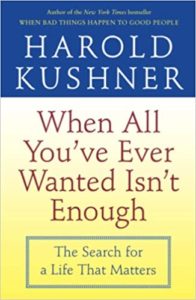 How about that title? I know a number of people who’ve fallen into that trap of “there’s never enough.” They’re all “hugely successful people” by society’s standards but they want more. And more times than not, they face a crisis–usually of their own making–that causes them to re-evaluate their life. The fortunate ones make adjustments and get their life back to what really matters.
How about that title? I know a number of people who’ve fallen into that trap of “there’s never enough.” They’re all “hugely successful people” by society’s standards but they want more. And more times than not, they face a crisis–usually of their own making–that causes them to re-evaluate their life. The fortunate ones make adjustments and get their life back to what really matters.
This book will help you discover what matters.
In his book, Rabbi Kushner wrote,
It is only when you are no longer afraid to die that you can say that you are truly alive. I believe that it is not dying that people are afraid of. Something else, something more unsettling and more tragic than dying frightens us. We are afraid of never having lived, of coming to the end of our days with the sense that we were never really alive, that we never figured out what life was for. Of all the fears that haunt us, from fear of the dark when we are young to fear of snakes and high places, there is nothing to compare it to the fear that we may have wasted our lives with nothing to show for it.
Here’s a link to a podcast with Rabbi Kushner that you might enjoy.
5. Awareness: The Perils and Opportunities of Reality by Anthony de Mello
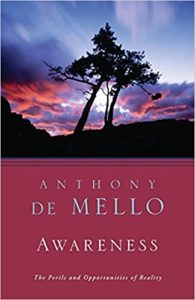 Okay, now we’re moving into woo woo space. Relax and be open. This is where breakthroughs start to happen.
Okay, now we’re moving into woo woo space. Relax and be open. This is where breakthroughs start to happen.
Anthony de Mello was a Jesuit priest born in Bombay, India in 1931. He is widely known for integrating western and eastern spirituality. Awareness takes de Mello’s teachings from spiritual retreats and packages them as short chapters on various topics. It’s very conversational since it’s taken from conversations.
Here’s de Mello,
Who’s living in you? It’s pretty horrifying when you come to know that. You think you are free, but there probably isn’t a gesture, a thought, an emotion, an attitude, a belief in you that isn’t coming from someone else. Isn’t that horrible? And you don’t know it. Talk about a mechanical life that was stamped into you. You feel pretty strongly about certain things, and you think it is you who are feeling strongly about them, but are you really? It’s going to take a lot of awareness for you to understand that perhaps this thing you call “I” is simply a conglomeration of your past experiences, of your conditioning and programming. That’s painful. In fact, when you’re beginning to awaken, you experience a great deal of pain. It’s painful to see your illusions being shattered. Everything that you thought you had built up crumbles and that’s painful.
Here’s a link to a video of de Mello on “Waking Up” that you may enjoy.
6. The Power of Now by Eckhart Tolle
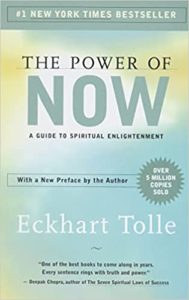 Tolle became a big star after Oprah did a series of shows with him. And for good reason. The Power of Now is an accessible book that blends a variety of traditions into a simple message of living in the now as the path to happiness and enlightenment. We can’t change the past, the future hasn’t arrived yet, so be here now. When you practice the concepts in the book, life’s setbacks become more manageable and you can free yourself from mental pain.
Tolle became a big star after Oprah did a series of shows with him. And for good reason. The Power of Now is an accessible book that blends a variety of traditions into a simple message of living in the now as the path to happiness and enlightenment. We can’t change the past, the future hasn’t arrived yet, so be here now. When you practice the concepts in the book, life’s setbacks become more manageable and you can free yourself from mental pain.
In his book, Tolle wrote,
The best indicator of your level of consciousness is how you deal with life’s challenges when they come. Through those challenges, an already unconscious person tends to become more deeply unconscious, and a conscious person more intensely conscious. You can use a challenge to awaken you, or you can allow it to pull you into even deeper sleep. The dream of ordinary unconsciousness then turns into a nightmare.
Here’s a link to a video of Tolle speaking at Google that you might enjoy.
7. Living Deeply: The Art & Science of Transformation in Everyday Life by Cassandra Vieten, Marilyn Schlitz, and Tina Amorok
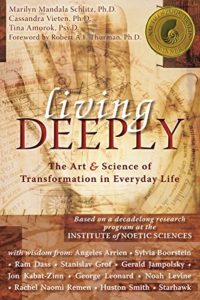 If I had to pick two words that act as catalysts in my life, I’d pick Mastery and Transformation. They serve as bookends to this first set of best books for financial advisors. I started with Mastery by George Leonard, and we’ll finish with Living Deeply, a book about personal transformation.
If I had to pick two words that act as catalysts in my life, I’d pick Mastery and Transformation. They serve as bookends to this first set of best books for financial advisors. I started with Mastery by George Leonard, and we’ll finish with Living Deeply, a book about personal transformation.
This book is a great complement to Leonard’s Mastery because so often, transformation occurs not as a bolt of lightening, but rather as a consistent practice over time. Similar to how water wears away rock, personal transformation usually requires integration time. You may have a transformational insight, that bolt of lightening, but it may take months or years of consistent practice to fully integrate the insight into your way of being.
In their book, the authors wrote,
The garden is a powerful metaphor for transformation. In the garden, seeds are planted and–with adequate light, water, and soil nutrients–they grow. As a gardener, you don’t make plants grow. Rather, you provide the ideal conditions for plants’ natural growth to take place. Similarly, most of the teachers in our studies talked about transformation as something that happens naturally. Even though you may have an internal resistance to change, you also have a natural inclination toward growth. Like the gardener, rather than making transformation happen, we create the ideal conditions for natural transformation to flourish.
Next Step
What resonated with you? While I recommend reading the books in the order I listed, the next best method is to pick the book that spoke to you. Read it then pick another. It can be a lot of work to put the key ideas from these best books for financial advisors into action. But mastery is an endless path whose reward is your transformation along the way.

